- Home
- Albert Camus
The Possessed
The Possessed Read online
THE
POSSESSED
A Play
in Three Parts
ALBERT CAMUS
Translated from the French by
JUSTIN O'BRIEN
ALFRED A. KNOPF
L. C. catalog card number: 60-7296
� Alfred A. Knopf, Inc., i960
THIS IS A BORZOI BOOK,
PUBLISHED BY ALFRED A. KNOPF, INC.
Copyright i960 by ALFRED A. KNOPF, INC. All
rights reserved. No part of this book may be re-
produced in any form without permission in writ-
ing from the publisher, except by a reviewer who
may quote brief passages in a review to be printed
in a magazine or newspaper. Manufactured in the
United States of America. Published simultane-
ously in Canada by McClelland & Stewart, Ltd.
FIRST AMERICAN EDITION
Originally published in French as LES POSSEDES.
� 1959, Librairie Gallimard.
FOREWORD
THE POSSESSED is one of the four or five works that
1 rank above all others. In many ways I can claim
that I grew up on it and took sustenance from it.
For almost twenty years, in any event, 1 have vis-
ualized its characters on the stage. Besides having
the stature of dramatic characters, they have the
appropriate behavior, the explosions, the swift and
disconcerting gait. Moreover, Dostoevsky uses a
theater technique in his novels: he works through
dialogues with few indications as to place and ac-
tion. A man of the theater�whether actor, director,
or author�always finds in him all the suggestions
he needs.
And now THE POSSESSED has reached the stage
after several years of labor and persistence. And yet
I am well aware of all that separates the play from
that amazing novel! I merely tried to follow the
book's undercurrent and to proceed as it does from
satiric comedy to drama and then to tragedy. Both
the original and the dramatic adaptation start from
a certain realism and endup in tragic stylization. As
for the rest, I tried, amidst this vast, preposterous,
panting world full of outbursts and scenes of vio-
Foreword
VI
lence, never to lose the thread of suffering and af-
fection that makes Dostoevsky's universe so close to
each of us. Dostoevsky's characters, as -we know
well by now, are neither odd nor absurd. They are
like us; we have the same heart. And if THE POS-
SESSED is a prophetic book, this is not only because
it prefigures our nihilism, but also because its pro-
tagonists are torn or dead souls unable to love and
suffering from that inability, wanting to believe and
yet unable to do so�like those who people our so-
ciety and our spiritual world today. The subject of
this work is just as much the murder of Shatov (in-
spired by a real event�the assassination of the stu-
dent Ivanov by the nihilist Nechayev) as the
spiritual adventure and death of Stavrogin, a con-
temporary hero. Hence we have dramatized not
only one of the masterpieces of world literature but
also a work of current application.
ALBERT CAMUS
N.B. The adaptation of THE POSSESSED reintegrates
into the work Stavrogin1 s confession (which was
not published because of censorship, though its
place in the narrative is known to us) and utilizes
the several hundred pages that make up the NOTE-
BOOKS of THE POSSESSED kept by the author while
he was writing the novel.
FIRST PART
v>xxO J.
GRIGORIEV, the narrator
STEPAN TROFIMQVICH
VERKHOVENSKY
VARVARA PETROVNA
STAVROGIN
LIPUTIN
SHIGALOV
IVAN SHATOV
VIRGINSKY
GAGANOV
ALEXEY YEGOROVICH
NICHOLAS STAVROGIN
PRASCOVYA DROZDOV
DASHA SHATOV
ALEXEY KIRILOV
LISA DROZDOV
MAURICE NICOLAEVICH
MARIA TIMOFEYEVNA
LEBYATKIN
CAPTAIN LEBYATKIN
PETER STEPANOVICH
VERKHOVENSKY
FEDKA
THE SEMINARIAN
LYAMSHIN
BISHOP TIHON
GAGANOV'S SON
MARIA SHATOV
NOTE: The necessities of stage production called for fairly
numerous cuts in the text of the adaptation. This
edition contains all the passages and scenes cut in
the production. They have been set between
brackets.
SETS
i. At Varvara Stavrogin's. A luxurious period drawing
room.
2. Filipov's poor rooming house. Double set, representing
a living room and a small bedroom.
3. The street.
4. Lebyatkin's dwelling. A wretched living room in the
suburb.
5. The forest.
6. At Tihon's. A vast hall in the Convent of the Virgin.
7. The main drawing room in the Stavrogin country-
house, at Skvoreshniki.
FIRST PART
When the theater is altogether dark, a spotlight
picks out the NARRATOR standing in front of the cur-
tain with hat in hand.
ANTON GRIGORIEV, the NARRATOR (cOUrteOUS, COlmy
and ironic) -.
Ladies and Gentlemen,
The strange events you are about to witness
took place in our provincial city under the in-
fluence of my esteemed friend Professor Stepan
Troflmovich Verkhovensky. The Professor had
always played a thoroughly patriotic role among
us. He was liberal and idealistic, loving the West,
progress, justice, and generally everything lofty.
But on those heights he unfortunately fell to
imagining that the Tsar and his Ministers had a
particular grudge against him, and he settled
among us to play the part of the persecuted
thinker in exile. It must be said that he did so with
great dignity. Simply, three or four times a year
he had attacks of patriotic melancholy that kept
him in bed with a hot-water bottle on his belly.
He lived in the house of his friend Varvara
Stavrogin, the widow of the General, who, after
her husband's death, had entrusted to him the up-
bringing of her son, Nicholas Stavrogin. Oh, I
forgot to tell you that Stepan Troflmovich was
First Part 4
twice widowed and once a father. He had shipped
his son abroad. Both his wives had died young,
and, to tell the truth, they hadn't been very
happy with him. But it is hardly possible to love
one's wife and justice at the same time. Conse-
quently, Stepan Trofimovich transferred all his
affection to his pupil, Nicholas Stavrogin, to
whose moral education
he applied himself most
rigorously until Nicholas fled home and took to
indulging in wild debauch. Hence, Stepan Tro-
fimovich remained alone with Varvara Stavrogin,
who felt an unlimited friendship for him�in
other words, she often hated him. That is where
my story begins.
SCENE 1
The curtain rises on Varvara Stavrogin's draining
room. The NARRATOR goes over and sits down at the
table to play cards with STEP AN TROFIMOVICH.
STEP AN: Oh, I forgot to ask you to cut the cards.
Forgive me, Anton, but I didn't sleep well at all
last night. How I regretted having complained to
you of Varvara!
GRIGORIEV: You merely said she was keeping you
out of vanity and that she was jealous of your
education.
STEP AN: That's what I mean. But it's not true!
Your turn. You see, she's an angel of honor and
sensitivity, and I'm just the reverse.
(VARVARA STAVROGIN comes in, but stops at the
door.)
VARVARA: Cards again! (They rise.) Sit down and
go on. I am busy. (She goes over to look at some
papers on a table at the left. They continue play-
ing, but STEP AN TROFIMOVICH keeps glancing at
VARVARA STAVROGIN, who finally speaks, avoiding
his eyes.) I thought you were to work on your
book this morning.
STEPAN: I took a walk in the garden. I had taken
Tocqueville under my arm�
VARVARA: And you read Paul de Kock instead.
But you have been announcing your book for
fifteen years now.
First Part
6
STEP AN: Yes, I have gathered the material, but I
have to put it together. It doesn't matter any-
way! I am forgotten. No one needs me.
VARVARA: You would be less forgotten if you
played cards less often.
STEP AN: Yes, I play cards. And it's unworthy of
me. But who is responsible? Who nipped my
career in the bud? Ah, que meure la Russie! I'll
trump that.
VARVARA: Nothing keeps you from working and
from proving by your work that people were
wrong to neglect you.
STEPAN: You are forgetting, chere amie, that I
have published a great deal.
VARVARA: Indeed? Who remembers that now?
STEPAN: Who? Why, our friend here certainly
remembers it.
GRIGORIEV: Of course I do. To begin with, your
lectures on the nature of the Arabs, then the start
of your study on the exceptional moral nobility
of certain knights at a certain period, and, above
all, your thesis on the importance that the small
city of Hanau might have achieved between 1413
and 1428 if it had not been prevented from doing
so by half-hidden causes, which you analyzed
brilliantly.
STEPAN: You have a memory like a steel trap, An-
ton. Thank you.
VARVARA: That is not the point. The point is that
for fifteen years you have been announcing a
a book and you haven't written a single word
of it.
STEPAN: Of course not, that would be too easy!
7 Scenei
I want to be sterile and solitary! That �will teach
them what they have lost. I want to be a living
reproach!
VARVARA: You would be if you spent less time in
bed.
STEPAN: What?
VARVARA: Yes, to be a living reproach one has to
stand on one's feet.
STEPAN: Standing up or lying down, the impor-
tant thing is to personify the idea. Besides, I am
active, I am active, and always according to my
principles. This very week I signed a protest.
VARVARA: Against what?
STEPAN: I don't know. It was . . . oh, I've for-
gotten. // fallait protester, voila tout. Oh, in my
time everything was different. I used to work
twelve hours a day. . . .
VARVARA: Five or six would have been
enough. . . .
STEPAN: I used to spend hours in the library gath-
ering mountains of notes. We had hope then!
We used to talk until daybreak, building the
future. Oh, how noble we were then, strong as
steel, firm as the Rock of Gibraltar! Those were
evenings truly worthy of Athens: music, Spanish
melodies, love of humanity, the Sistine Madonna
. . . O ma noble et fidele amie, have you any
idea of all I gave up?
VARVARA: No. (She rises.) But I know that if you
talked until dawn you couldn't work twelve
hours a day. Besides, all this is mere talk! You
know that at long last I am expecting my son,
Nicholas, any moment. ... I must have a word
First Part
8
with you. (GRIGORIEV gets up, comes over, and
kisses her hand.) Thank you, Anton, you are
discreet. Stay in the garden and you can come
back later.
(GRIGORIEV leaves.)
STEP AN: Quel bonheur, ma noble amie, de revoir
notre Nicolas!
VARVARA: Yes, I am very happy. He is my whole
life. But I am worried.
STEP AN: Worried?
VARVARA: Yes�don't act like a male nurse�I am
worried. By the way, since when have you been
wearing red neckties?
STEP AN: Why, just today I�
VARVARA: It doesn't suit your age, in my opinion.
Where was I? Yes, I am worried. And you know
very well why. All those rumors ... I can't
believe them, and yet I can't forget them. De-
bauchery, violence, duels, he insults everybody,
he frequents the dregs of society! Absurd, ab-
surd! And, yet, suppose it were true?
STEP AN: But it isn't possible. Just remember the
dreamy, affectionate child he was. Just remember
the touching melancholies he used to fail into. No
one but an exceptional soul can feel such melan-
choly ... as I am well aware.
VARVARA: You are forgetting that he is no longer a
child.
[STEPAN: But his health is poor. Just remember:
he used to weep for nights on end. Can you
imagine him forcing men to fight?
VARVARA: He was in no way weak! What has
made you imagine that? He was simply high-
g Scene i
strung, that's all. But you got it into your head
to wake him up in the middle of the night, when
he was twelve years old, to tell him your trou-
bles. That's the kind of tutor you were.
STEPAN: he cher ange loved me. He used to ask
me to confide in him and would weep in my
arms.
VARVARA: The angel has changed. I am told that I
wouldn't recognize him now, that his physical
strength is exceptional.]
STEPAN: But what does he tell you in his letters?
VARVARA: His letters are few and far between but
always respectful.
STEPAN: You see?
VARVARA: I see nothing. You should get out of the
habit of talking without saying anything. And,
besides, the facts speak for themselves. Did he or
didn't he have his commission taken away from
him because he had seriously wounded another
officer in a duel?
STEPAN: That's not a crime. He was motivated by
the warmth of his noble blood. That's all very
chivalrous.
VARVARA: Yes. But it is less chivalrous to live in
the vilest sections of St. Petersburg and to enjoy
the company of cutthroats and drunkards.
STEPAN (laughing): Oh, that's simply Prince Har-
ry's youth all over again!
VARVARA: What do you mean by that?
STEPAN: Why, Shakespeare, ma noble amie, im-
mortal Shakespeare, the genius of geniuses, great
Will, in short, who shows us Prince Harry in-
dulging in debauch with his friend Falstaff.
First Part
10
VARVARA: I shall reread the play. By the way, are
you taking any exercise? You are well aware that
you should walk six versts a day. Good. In any
case, I asked Nicholas to come home. I want you
to sound him out. I plan to keep him here and to
arrange his marriage.
STEPAN: His marriage! Oh, how romantic that is!
Have you anyone in mind?
VARVARA: Yes, I am thinking of Lisa, the daughter
of my friend Prascovya Drozdov. They are in
Switzerland with my ward, Dasha. . . . But
what does it matter to you?
STEPAN: I love Nicholas as much as my own son.
VARVARA: That isn't much. Altogether, you have
seen your son only twice, including the day of
his birth.
STEPAN: His aunts brought him up and I sent him
regularly the income from the little estate his
mother left him, and all the time I suffered bit-
terly from his absence. Moreover, he's a complete
dud, poor in spirit and poor in heart. You should
see the letters he writes me! You would think he
was speaking to a servant. I asked him with all my
paternal love if he didn't want to come and see
me. Do you know what he replied? "If I come
home, it will be to check up on my accounts, and
to settle accounts too."
VARVARA: Why don't you learn once and for all
to make people respect you? Well, I shall leave
you. It is time for your little gathering. Your
friends, your little spree, cards, atheism, and,
above all, the stench, the stench of tobacco and
of men ... I am leaving. Don't drink too much;
11
Scene i
you know it upsets you. . . . Good-by! (She
looks at him; then, shrugging her shoulders:) A
red necktie! (She leaves.)
STEPAN (follows her with his eyes, starts to stam-
mer, then looks toward the desk): O femme
cruelle, implacable! And I can't talk to her! I
shall write her a letter! (He goes toward the
table.)
VARVARA (thrusting her head in the door): And, by
the way, stop writing me letters. We live in the
same house; it is ridiculous to exchange letters.
Your friends are here. (She leaves, GRIGORIEV,
LIPUTIN, and SHIGALOV come in.)
STEPAN: Good day, my dear Liputin, good day.
Forgive my emotion. ... I am hated. . . . Yes,
I am literally hated. But I don't care! Your wife
is not with you?
LIPUTIN: No. Wives must stay at home and fear
God.
STEPAN: But aren't you an atheist?
LIPUTIN: Yes. Shhhh! Don't say it so loud. That's
just it. A husband who is an atheist must teach
his wife the fear of God. That liberates him even
more. Look at our friend Virginsky. I just met
him now. He had to go out and do his marketing
himself because his wife was with Captain Leb-
yatkin.
STEPAN: Yes, yes, I know what people say, but it's
not true. His wife is a noble creature. Besides,
they all are.
LIPUTIN: What, not true? I was told it by Vir-
ginsky himself. He converted his wife to our
ideas. He convinced her that man is a free crea-
First Part
12
ture, or ought to be such. So she freed herself
and, later on, simply told Virginsky that she was
dismissing him as her husband and taking Captain
Lebyatkin in his place. And do you know what
Virginsky said to his wife when she announced
this news? He said: "My dear, up to now I
merely loved you; from now on, I esteem you."
STEP AN: He's a true Roman.
GRIGORIEV: I was told, on the contrary, that when
his wife dismissed him, he burst into sobs.
STEPAN: Yes, yes. He's an affectionate soul, (SHA-
TOV comes in.) But here's our friend Shatov. Any
news of your sister?
SHATOV: Dasha is about to come home. Since you
ask me, I shall tell you that she is bored in Swit-
zerland with Prascovya Drozdov and Lisa. I am
telling you, although in my opinion it is no con-
cern of yours.
STEPAN: Of course not. But she is coming home,
and that is the main thing. Oh, my dear friends,
it's impossible to live far from Russia�
LIPUTIN: But it's impossible to live in Russia too.
We need something else, and there is nothing.
STEPAN: What do you suggest?
LIPUTIN: Everything must be made over.
SHIGALOV: Yes, but you don't draw the conclu-
sions, (SHATOV goes over and sits down gloomily
and places his cap beside him. VIRGINSKY and then

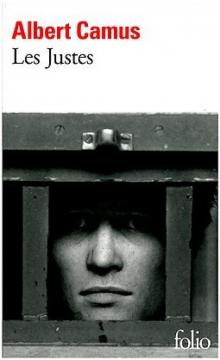 Les Justes
Les Justes The Sea Close By
The Sea Close By The Stranger
The Stranger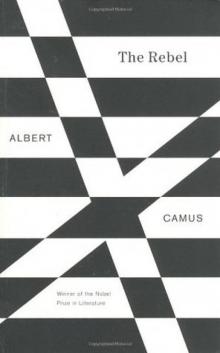 The Rebel: An Essay on Man in Revolt
The Rebel: An Essay on Man in Revolt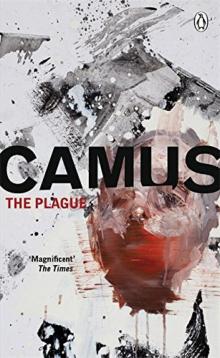 The plague
The plague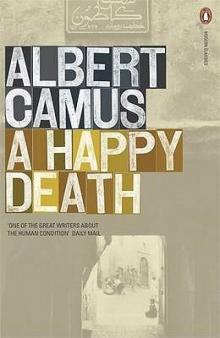 A Happy Death
A Happy Death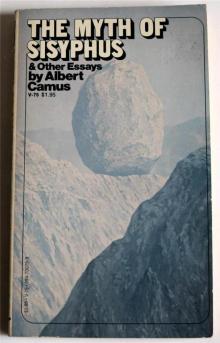 The Myth of Sisyphus and Other Essays
The Myth of Sisyphus and Other Essays The Fall
The Fall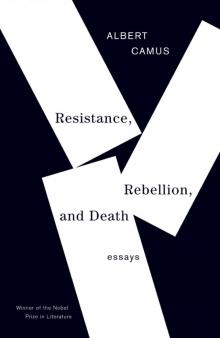 Resistance, Rebellion, and Death
Resistance, Rebellion, and Death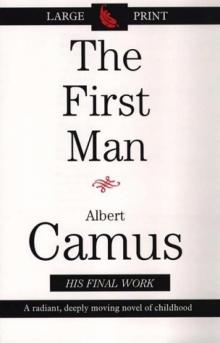 The First Man
The First Man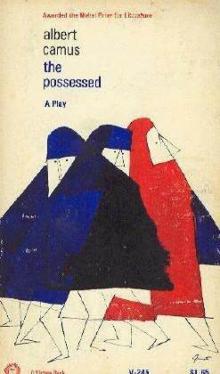 The Possessed
The Possessed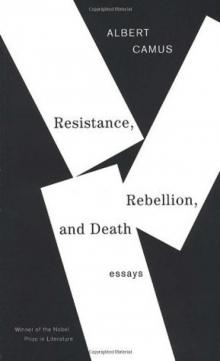 Resistance, Rebellion and Death: Essays
Resistance, Rebellion and Death: Essays